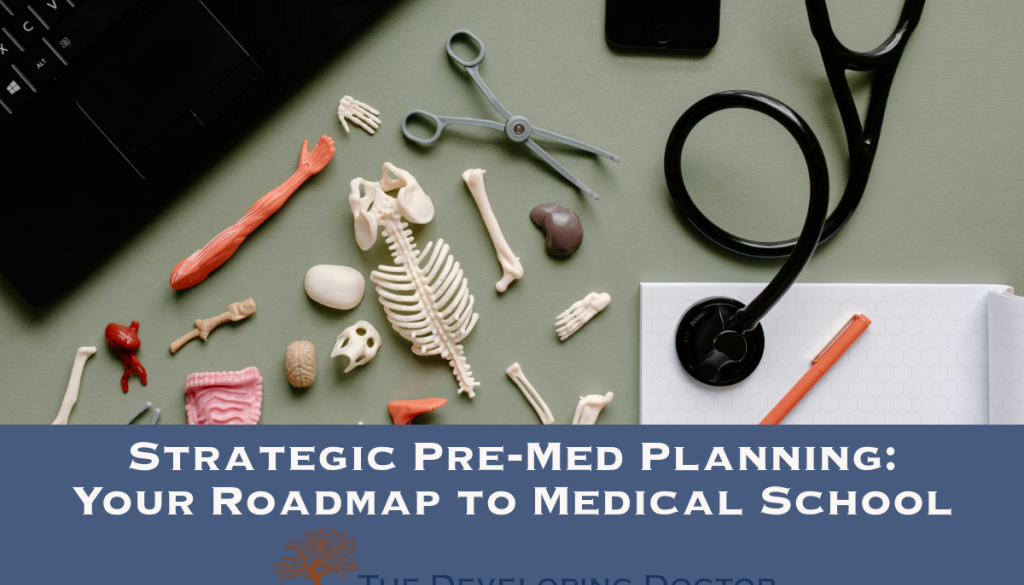The Ultimate Guide to Thriving as a Pre-Med Student
Complete Pre-Med Success Guide: From College Selection to Medical School Admission
Embarking on the journey to become a doctor is no small feat. As a pre-med student, your undergraduate years are a pivotal time to build a foundation for success in medical school and beyond. After 20 years of working in academic medicine and coaching countless students, I have noticed some common themes so I put together this comprehensive guide to help premeds like you craft a medical admissions plan that allows you to thrive academically, balance extracurriculars, and stand out in your medical school application and interviews! Let’s dive into this foolproof premed success guide designed to maximize your undergraduate experience and increased you chance of becoming a doctor!
Choosing the Right College: Does Reputation Matter?
The first major decision as a pre-med student is selecting the right college. Contrary to popular belief, there’s no “perfect” school that guarantees admission to medical school. Instead, focus on choosing an environment where you can thrive based on factors like location, cost, size, and proximity to family and friends. Consider the school’s atmosphere—whether competitive or laid-back—and pick what suits you best. What is best for one premed student might not work for another. Use your head to select schools that offer all the prerequisite courses and your heart when picking the school that fits you!
Key takeaway: For most medical schools, the reputation of your undergraduate college doesn’t play a significant role. However, if your goal is to attend a highly competitive medical school, the prestige of your chosen college might carry some weight.
Picking a Major: Follow Your Passion
When it comes to choosing a major, don’t feel pressured to stick to the sciences. Medical schools are looking for intelligent, well-rounded, and hard-working students with diverse interests. Pick a major that you enjoy and that challenges you academically. While your choice of major doesn’t heavily influence admissions, your GPA and the rigor of your coursework do. Regardless of your major, ensure you complete the required science and non-science courses, such as biology, chemistry, physics, calculus, statistics, psychology, and sociology. Electives like medical ethics, death and dying, or even creative courses like theater and foreign languages can set you apart from other applicants.
Planning Your Timeline: Stay Organized
Time management is critical for pre-med students. While the traditional undergraduate timeline spans four years, many students find it challenging to balance coursework, extracurriculars, and MCAT preparation. If needed, consider extending your timeline to five years, taking summer courses, or even opting for a gap year. Your timeline should include ample time for studying, volunteering, shadowing, working (if necessary), and engaging in clinical activities. Don’t forget to prioritize self-care—exercise, family time, and relaxation are just as important as academics. Choose a path that works best for you and allows you to excel without feeling rushed.
Excelling in Extracurricular Activities
Extracurriculars are a vital part of your application, showcasing qualities that grades and test scores cannot. Make sure you balance clinical and non-clinical experiences:
Clinical activities: Long-term volunteering or paid roles (great for obtaining reference letters) and short-term shadowing opportunities to explore various medical fields.
Non-clinical activities: These should align with your interests and can include research, student organizations, athletics, music, or leadership roles. Unique options like art or improvisation classes can help you stand out. Start planning your extracurriculars early and aim for a mix of short-term and long-term commitments. These experiences not only enrich your resume but also help you grow personally and professionally.
Overcoming Challenges: GPA and Setbacks
Struggling in a course or dealing with a lower-than-average GPA? Don’t panic—it’s all part of the journey. If you’re struggling, seek help early by finding a tutor or asking for assistance. If your GPA falls below the average range (3.6–3.8 for most medical schools), consider these strategies:
- Reduce your course load to focus more on each subject.
- Retake courses if your school allows grade replacement.
- Enroll in a post-baccalaureate program or graduate school to demonstrate academic improvement.
Admissions committees also look at trends in your GPA, so consistent improvement can work in your favor. Remember, setbacks are opportunities for growth, not roadblocks.
Balancing Fun and Focus
College is more than just academics and extracurriculars—it’s a time for personal growth and enjoyment. Take advantage of this time to find out who you are. Challenges yourself personally and academically. These experiences are important for you personall and will allow you to develop skills needed to thrive as a doctor. Have fun, form relationships, develop hobbies, and make time for relaxation, but not at the expense of your GPA, MCAT prep, or other responsibilities. Striking the right balance is key to a fulfilling undergraduate experience.
Final Thoughts: Your Road to Success
Becoming a doctor is a long road that requires careful planning, hard work, and resilience. By choosing the right college, major, and timeline, and excelling in both academics and extracurriculars, you can set yourself up for success. Remember, the journey is just as important as the destination.
Need personalized guidance? I offer coaching programs for pre-med students to help them navigate their undergraduate experience and increase their chances of admission to medical school. Schedule a complimentary coaching session today to start turning your dreams into reality!





